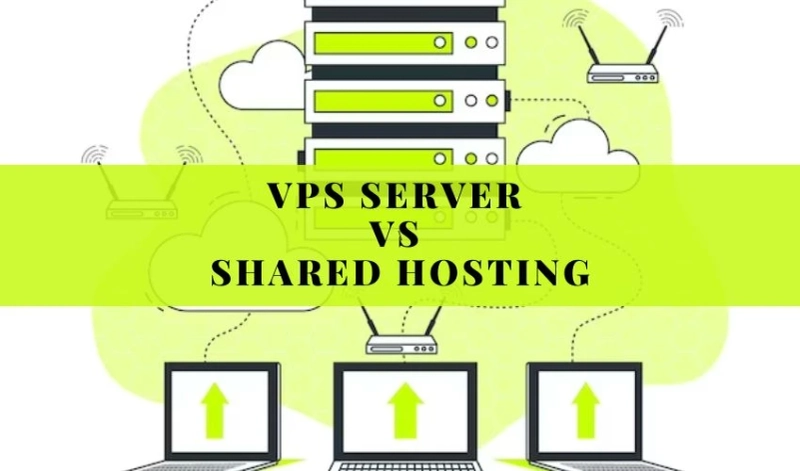VPS Server vs Shared Hosting, choosing the right hosting solution is a critical decision that can significantly impact the performance and success of your website. Two popular options are Virtual Private Server hosting and shared hosting. Both have their unique advantages and limitations, and it’s essential to understand the differences between them to make an informed choice. In this blog post, we’ll explore the features, benefits, and drawbacks of VPS hosting and shared hosting to help you determine which one suits your website’s needs.
Shared Hosting: The Basics
Shared hosting is an entry-level web hosting option that is both affordable and straightforward. In this types of hosting, multiple websites share resources on a single server. This server is managed by a hosting provider who takes care of server maintenance, security, and technical support. Here’s a closer look at shared hosting’s key features:
Affordability: Shared hosting is the most cost-effective option for hosting your website. The resources are shared among multiple users, making it an ideal choice for budget-conscious individuals and small businesses.
Ease of Use: Shared hosting is incredibly user-friendly, making it a great choice for beginners who may not have much technical knowledge. Most hosting providers offer user-friendly control panels for managing your website.
Limited Resources: Since resources like CPU, RAM, and bandwidth are shared among multiple websites, shared hosting can become slow and unreliable if one site experiences high traffic or resource usage.
Security Concerns: The shared nature of this hosting type means that your website’s security can be compromised if another site on the same server has vulnerabilities. However, hosting providers often implement security measures to mitigate these risks.
Scalability: Shared hosting is not the best choice if you expect rapid growth, as you have limited control over server resources and configurations.
VPS Hosting: A Deeper Dive
VPS hosting offers a more advanced and flexible hosting solutions. In a VPS environment, a single physical server is divided into multiple virtual servers, each with its dedicated resources and operating system. This virtualization technology provides several benefits:
Isolation: Each VPS operates independently, ensuring that the actions of other websites on the same physical server won’t affect your site’s performance. This enhanced isolation leads to improved reliability and security.
Customization: VPS hosting gives you greater control over then your server environment. You can install custom software, configure server settings, and even select your operating system.
Performance: With dedicated resources, VPS hosting offers better performance, making it suitable for websites with moderate to high traffic or resource demands.
Scalability: VPS hosting allows you to scale resources up or down as your website’s needs change, making it a viable option for growing businesses and websites.
Security: VPS hosting provides enhanced security features, reducing the risk of security breaches due to shared resources.
How to Choose Between VPS Hosting and Shared Hosting
The decision between VPS hosting and shared hosting should be based on your website’s specific needs and your long-term goals. Here are some key consideration to help you make the right choice:
1. Budget: Shared hosting is the more economical choice, making it perfect for personal websites, small blogs, or startups with limited budgets. VPS hosting is more expensive but offers better performance and flexibility.
2. Website Traffic: Consider your website’s expected traffic. If you anticipate a steady stream of visitors or sudden traffic spikes. VPS hosting is a better option due to its dedicated resources and scalability.
3. Resource Requirements: Evaluate your resource needs, such as CPU, RAM, and storage. VPS hosting allows you to allocate resources according to your requirements, while shared hosting offers a fixed resource allocation.
4. Technical Expertise: Shared hosting is user-friendly and requires minimal technical knowledge. In contrast, VPS hosting requires a better understanding of server management and configurations. If you’re not tech-savvy, you may need managed VPS hosting.
5. Security: If you prioritize security and want to reduce the risk of security breaches, VPS hosting provides a more secure environment due to its isolation from other users.
6. Long-term Goals: Consider your website’s growth potential. If you expect your site to expand in the future. VPS hosting is a more suitable choice because of its scalability and customization options.
Conclusion
VPS Server vs Shared Hosting the choice between VPS hosting and shared hosting depends on your specific needs and preferences. Shared hosting is an excellent option for those on a tight budget and with minimal technical knowledge. While VPS hosting offers better performance, security, and customization for websites with higher demands and growth ambitions. Carefully assess your requirements and budget to make an informed decision that sets your website up for success.
Media Source news: VPS Server vs Shared Hosting



